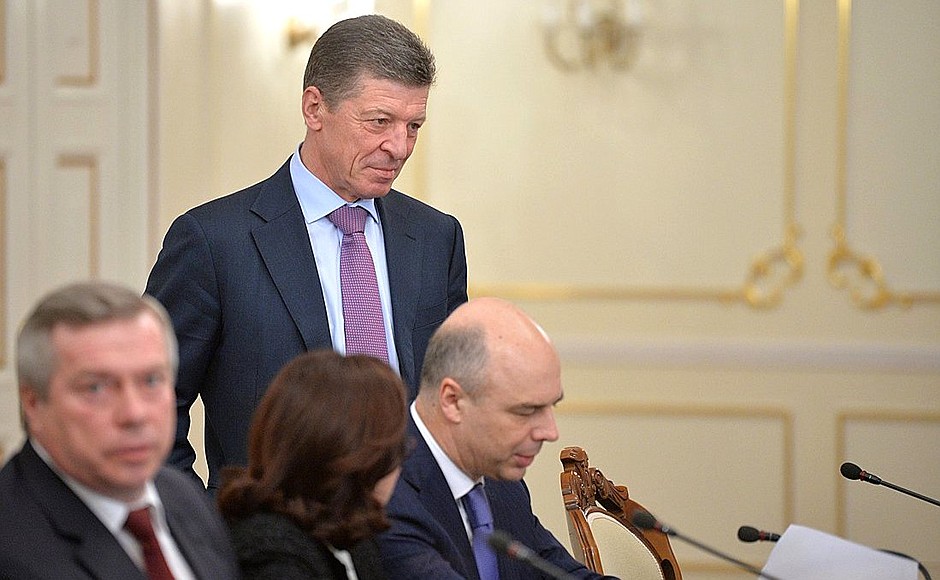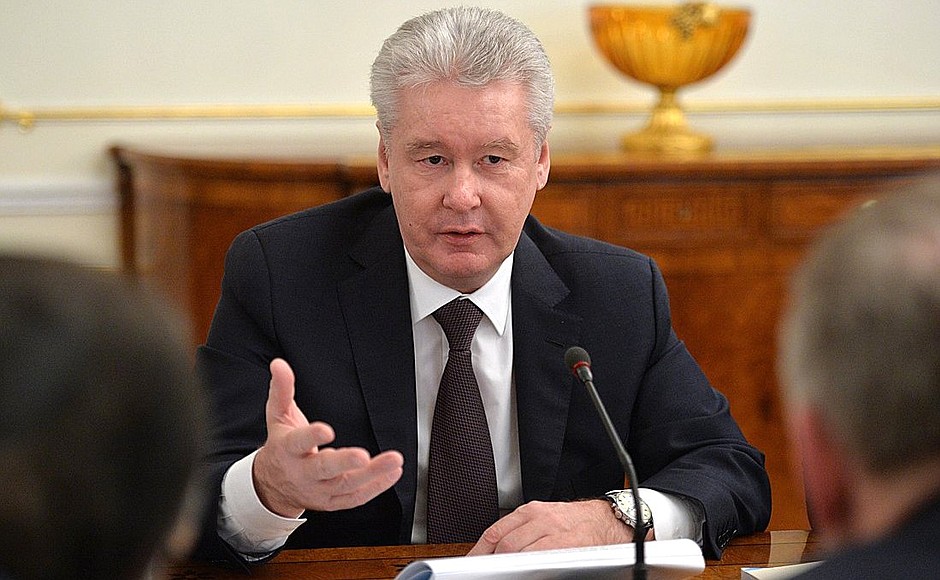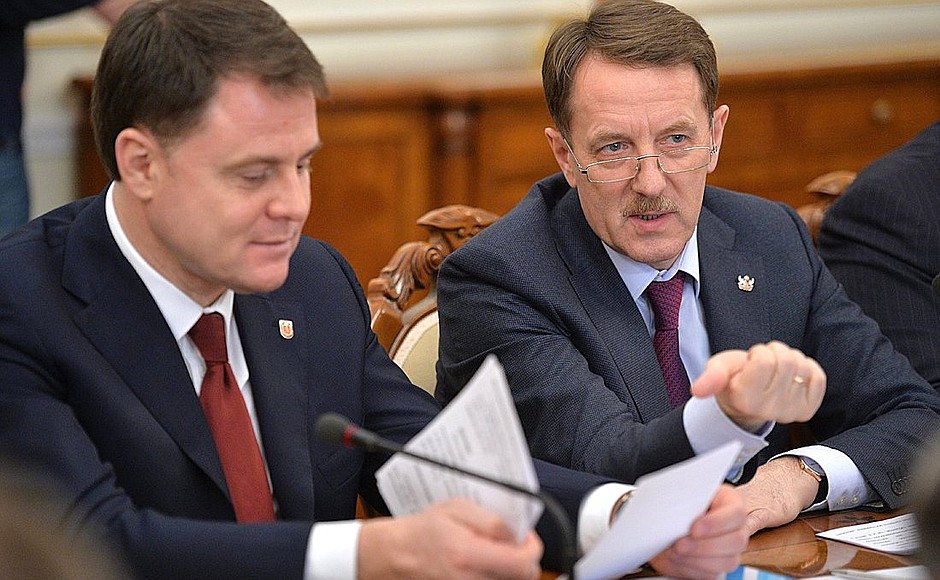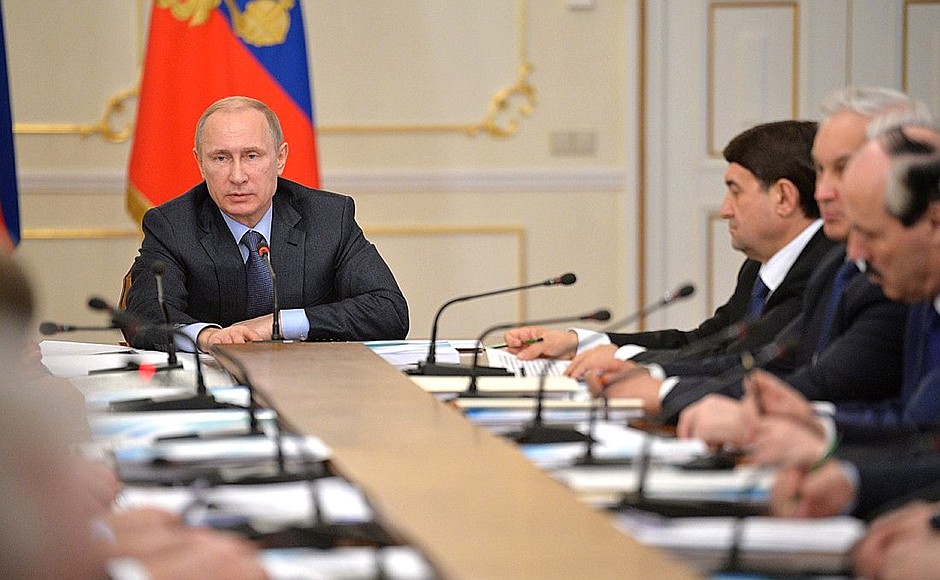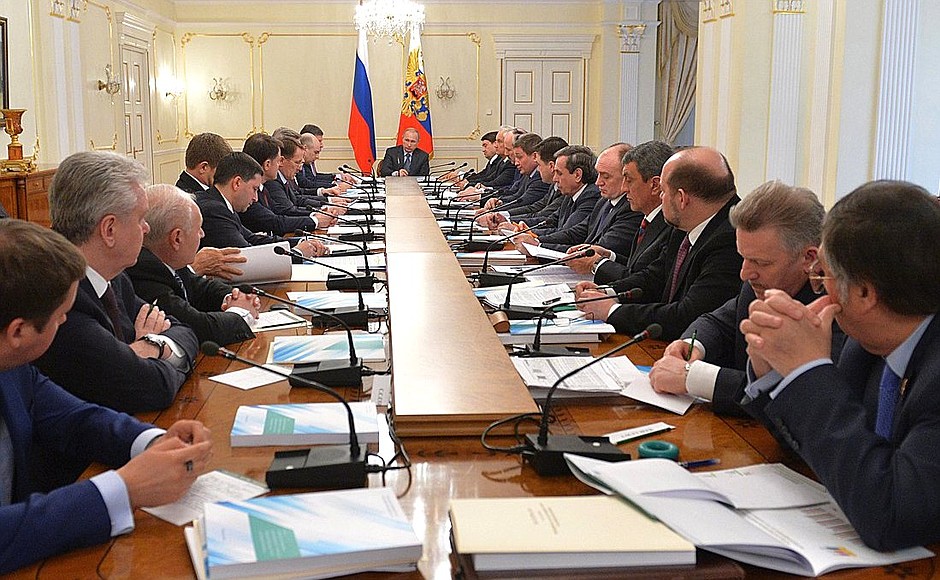The meeting participants discussed, in particular, prospects for improving regional budgets’ stability in the current macroeconomic situation and measures to cut regional budget’s debt burden over 2015.
* * *
President of Russia Vladimir Putin: Good afternoon, colleagues,
On our agenda today, we have measures to ensure sustainable socioeconomic development of the regions. This is a very important, multifaceted task, especially given the current conditions – you know what I mean.
In this situation, we should all act consistently, quickly and proactively, and this applies to the regions as well. They should not wait for special instructions from the top, though all our efforts should be coordinated – something I will dwell on later.
This is especially important because many of the regions have already acquired certain experience of working under complex conditions of previous years. Today this experience is extremely valuable and very much in demand. Therefore, attending this meeting are not only Presidium members, but also regional heads, members of the State Council advisory commission. We agreed earlier to meet in this expanded format.
As you may know, the Government has already begun implementing this year’s plan to ensure stable socioeconomic development. The regions are also working on such plans, and I hope they have them ready.
The measures and methods specified in these plans, directed primarily at levelling out the primary risks are of extreme importance and I expect them to bring about the required effect. However, at the same time we have to consider our development prospects, look at the medium term and, as usual, bear in mind the long-term matters of a systematic nature.
”Coming to the fore here is the principle of economic and targeted use of budget funds. This means, among other things, that these resources should be channelled into social security for those citizens who really need it.“
It is extremely important for each of the regions to conduct an in-depth and thorough analysis of their resources and capabilities, identify priority areas of development, internal reserves and work out, as I have already said, efficient mechanisms for the proper use of these reserves.
I believe that the Government commission for economic development and integration headed by Igor Shuvalov should work directly with the regions, have a good understanding of the situation there and coordinate the implementation of anti-crisis measures. Besides, the commission I have just mentioned should include representatives of the gubernatorial corps.
One of the most acute issues now is the financial situation, including the regional budgets. As we all know, many of them bear a heavy burden of debt and loans, including those extended by commercial banks.
The money was borrowed in a different financial and economic situation, of course. Today it often happens that servicing the debt requires ever more funds that have to be diverted from investment and from resolving development tasks.
I would like to add here that unfortunately, the state competes with businesses, with the real economy, the industry and agriculture on the lending market, which requires special attention and support. We are now working on replacing market loans taken out by the regions with loans from the federal budget reducing at the same time the cost of such loans.
This meeting should assess the efficiency of the procedure for extending such loans and analyse what extra measures are required to relieve the debt burden on the regions. I also suggest considering what the regions themselves plan to do to resolve this situation.
A key issue is improving the efficiency of interbudgetary subsidies. The Government has received appropriate instructions. We need to develop a mechanism for joint funding of regional and municipal expenditures using consolidated interbudgetary subsidies, rule out any violations of deadlines for distributing these subsidies and ensure the subsidies reach the regions.
We all know how it often happens: decisions are made, but they remain on paper for quite some time because of the bureaucratic delays and low-key manner of the federal authorities when trying to get things done. As a result, the regions receive the funds with great delays, though the executive authorities report that all is fine.
I would also like to draw your attention to the need to raise the efficiency of budget spending. I would like to state that a simple cutdown in spending – though often we really do need to optimise – is the easiest solution, but sometimes an absolutely inappropriate one.
Coming to the fore here is the principle of economic and targeted use of budget funds. This means, among other things, that these resources should be channelled into social security for those citizens who really need it.
We have been speaking of this for many years, but there has not been any clear and system-wide solution to this situation, which is vital for the citizens. I would like to ask you to return to this matter today to finally develop a specific and functional model.
We have said on numerous occasions that spreading it out thinly all over the pie is pointless – we have to provide assistance to those who really need it, who find it difficult without state support.
I would like to reiterate that matters of financial support to the regions are among the most important and the most complicated ones today. There are resources available in practically every region’s budget policy that remain unused.
This applies to precise prioritising, especially now, when we need to take into consideration the entire scope of complicated circumstances. This also means ensuring the maximum efficiency of all the projects implemented in the regions. This is about smartly using the existing resources and avoiding inefficient spending. This is also about approaching the matters at hand in a balanced and economic way.
Another thing I keep talking about, and will highlight yet again – clearly, as we prioritise, our decision-making should be transparent, and you should maintain close contact with your legislative assemblies, with political parties, public organisations and citizens.
Let’s get down to work.
<…>
